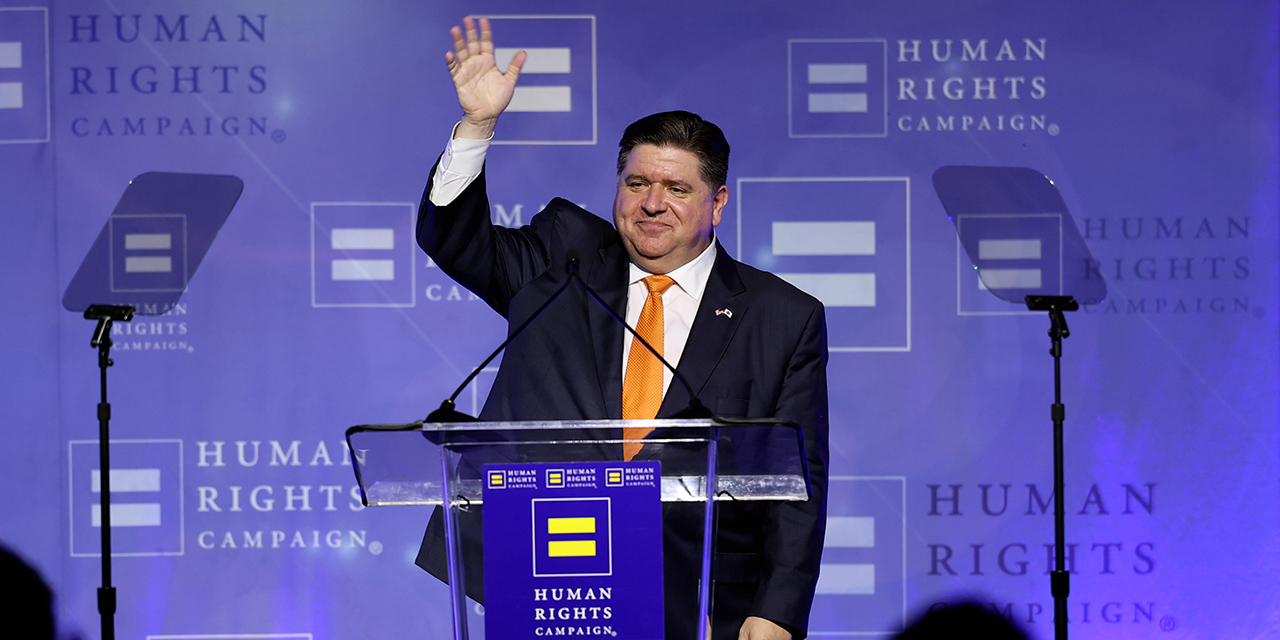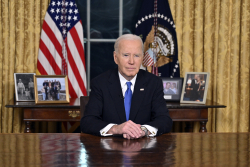
Illinois governor J. B. Pritzker’s 2025 budget reveals a notable retreat from progressive ambitions. Despite his past advocacy for expansive government programs and robust social spending, Pritzker proposes neither substantial tax increases nor significant new initiatives. Most conspicuously absent from his accompanying budget speech was any mention that the state would no longer fund free health care for illegal aliens aged 42 to 64. Extending coverage to that age cohort had been one of his recent progressive efforts, introduced with fanfare. The governor had to abandon it after costs surged 286 percent beyond original projections, producing budgetary shortfalls of hundreds of millions of dollars.
The governor obscured these fiscal realities with rhetorical theatrics. Instead of openly addressing the tough decisions demanded by economic constraints, Pritzker embraced provocative political symbolism, invoking comparisons between Donald Trump, the MAGA movement, and Nazi Germany. His polarizing peroration sparked enthusiastic applause from Democratic legislators and walkouts from Republicans, effectively drowning out substantive budget discourse with partisan conflict, which dominated the ensuing media coverage.
Finally, a reason to check your email.
Sign up for our free newsletter today.
This reliance on extreme rhetoric follows logically from the structural dilemma facing contemporary progressivism. Illinois simply cannot afford expansive liberal policies. Tax revenues have stagnated amid demographic decline. Indeed, Illinois is among the few states that has lost population so far this decade. Its business climate ranks 48th out of 50 states, according to a poll of CEOs by Chief Executive, further discouraging the economic growth needed to support more taxes and spending. What business would want to move to Illinois, with a shrinking pool of potential employees and the high taxes needed to sustain its notoriously underfunded public-pension obligations?
Pritzker thus finds himself caught in a political vise, particularly acute for someone contemplating a run at the Democratic presidential nomination in 2028. He must satisfy constituencies demanding expansive programs, but Illinois lacks the fiscal resources to deliver. Raising taxes, meantime, has proved politically infeasible. Even Democratic voters are skeptical of providing yet more resources to a government burdened by fiscal imprudence and union-driven debt. In 2020, a good year for Democrats electorally, voters rejected amending the state’s constitutional requirement that income taxes be flat, despite Pritzker’s spending millions of his own fortune to support it. Last year, Chicagoans voted down a proposal championed by its leftist mayor, Brandon Johnson, to impose a special tax on sales of “mansions.” Thus, Pritzker’s only move on taxes was to eliminate an already-tiny grocery sales tax—a reduction that didn’t cost the government much but reflected a modest attempt to respond to antitax sentiment that has finally found its way to Illinois.
One Pritzker strategy, then, has been to dial up the rhetoric. His Nazi comparison is only the most inflammatory of his almost weekly rhetorical attacks on the Trump administration. Talk is a cheap way of keeping his progressive base on side. Another strategy has been to take a hard-left line on social issues—not only abortion but also transgenderism. Shortly after the November elections, for instance, Pritzker observed Transgender Awareness Week. “Illinois has enshrined protections for gender-affirming care to meet this moment,” the governor said, “and because of that, you will have a home here always.” Such policies don’t demand much in the way of funding but boost progressive bona fides.
Illinois’ predicament is severe but not unique. Governors of deep-blue states such as Oregon and Connecticut also grapple with slow growth, fleeing populations, and constrained budgets. What has often been their political approach—fiscal retrenchment, coupled with shrill cultural rhetoric and symbolic gestures—mirrors Pritzker’s. Rather than address fundamental budgetary challenges, they increasingly rely on cost-free political posturing.
After Trump’s decisive victory, some Democratic pundits have urged moderation, bipartisan collaboration, and renewed appeals to working-class voters through targeted spending. But Pritzker and some other governors don’t appear ready to shift course. Entrapped by policy failures and constrained by the progressives in their political coalition, they’re more likely to stick with the cultural politics that continue to alienate them—and their states—from middle America.
Photo: Photo by Matt Winkelmeyer/Getty Images Entertainment via Getty Images for Human Rights Campaign
City Journal is a publication of the Manhattan Institute for Policy Research (MI), a leading free-market think tank. Are you interested in supporting the magazine? As a 501(c)(3) nonprofit, donations in support of MI and City Journal are fully tax-deductible as provided by law (EIN #13-2912529).
Source link

















